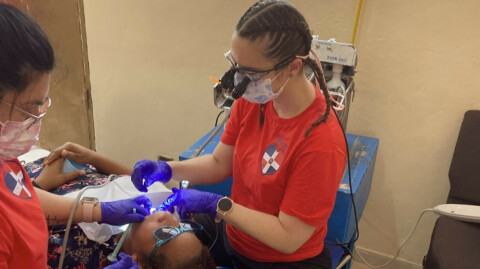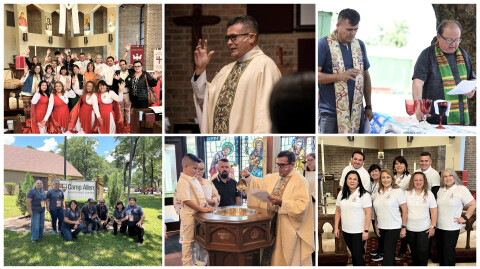This last Sunday I used a prayer called “An Invitation to Spiritual Communion,” which sounded mysterious and beautiful at the same time. Right after “The Fraction” and the consumption of the consecrated elements, I asked you all to repeat after me the following prayer,
My Jesus, I believe that you are truly present in the Blessed Sacrament of the Altar.
I love you above all things, and long for you in my soul.
Since I cannot now receive you sacramentally,
come at least spiritually into my heart.
As though you have already come,
I embrace you and unite myself entirely to you;
never permit me to be separated from you. Amen.
This particular prayer was written by St. Alphonsus de Liguori, (1696-1787) but this is just one of many prayers of spiritual communion in existence. Spiritual Communion expresses anintense longing to receive Jesus, and to be in communion with him through the Holy Eucharist, which for whatever reason is not available at the time. Saint Thomas Aquinas in the 13th century describe these types of prayers as “An ardent desire to receive Jesus in the Holy Sacrament and a loving embrace as though we had already received Him.”
In our Roman Catholic catechism, we were taught to long to be in communion with Jesus during the week, and to pray for him to come into our hearts, in preparation for Sunday Mass. This was a way of extending the benefits of Sunday’s communion into each day of the week. Historically, however, spiritual communion was used not so much as preparation for Sunday Mass, but as an alternative to physical communion in far-away villages that had no access to a priest, by soldiers at war, by those who were being persecuted for their faith and had to abandon their churches, and by those who were displaced from their communities by various political conflicts.
In a wonderful blog post in the Anglican Compass, Fr. Jonathan Warren Pagán, a Doctor in the History of Christianity, writes “Pope John Paul II, in his encyclical Ecclesia de Eucharistia, says that the Eucharist is at the center of the church’s life, and therefore ‘precisely for this reason it is good to cultivate a constant desire for the sacrament of the Eucharist.’ The cultivation of this desire is the origin of the practice of spiritual communion, which is commended by all the saints. He quotes Teresa of Ávila who says in her Way of Perfection, ‘when you do not receive communion and you do not attend Mass, you can make a spiritual communion, which is a most beneficial practice; by it the love of God will be greatly impressed on you.’”
Phillip Tovey, in his book, The Theory and Practice of Extended Communion states, “Spiritual Communion is another part of the Anglican tradition. The 1549 Prayer Book said that if the person is so sick as to be unable to receive the elements but is repentant, they eat and drink spiritually. This statement is incorporated into many prayer books of the Communion.” Tovey is absolutely correct about this. In fact, Dr. Ruth A. Myers, a known liturgist of our Denomination states, “The 1979 Prayer Book refers to spiritual communion in the form for Ministration to the Sick, directing the priest to assure a person unable to eat and drink the bread and wine ‘that all the benefits of Communion are received even though the Sacrament is not received with the mouth (BCP 457)’” (https://cdsp.edu/2020/04/spiritual-communion-in-a-season-of-social-distancing/.)
At this point in our history, the COVID-19 pandemic has forced us back into the shelter of our homes. We are unable to come together as the body of Jesus to celebrate the Holy Sacraments and partake of the common bread and common cup. We have been here before, however. And now we must do as saints of ages past did, and as today’s saints who live in remote or hostile territories do. We express our ardent desire to receive Jesus sacramentally as we celebrate the gift of technology, which allows us to watch the Sunday service online and to be in community at various Bible studies and Reunion groups during the week. We express in our prayer life our communal and personal lament for Jesus’ absence from us in his sacramental body and blood. We use our Spiritual Communion prayer in liturgy and personal prayer, joining saints of all ages who were/are unable to receive communion for whatever reason. And we pray for the time when we can gather again at the great banquet of the Lord’s table. Please remember that he is with you and loves you immensely.
May he continue to bless you,
Fr. Roman+





